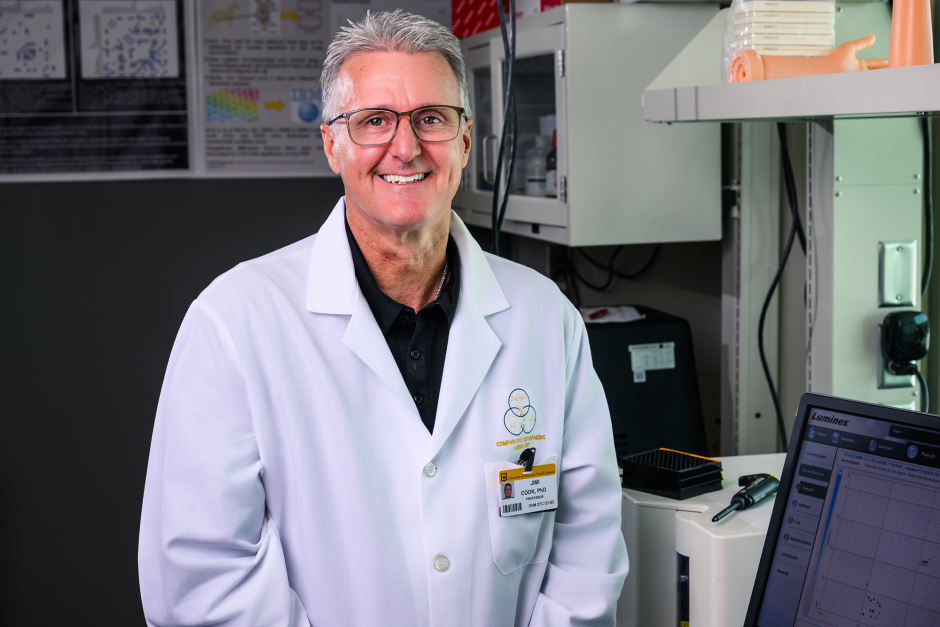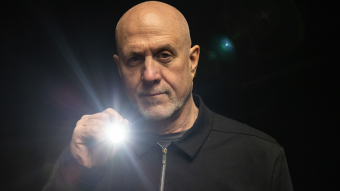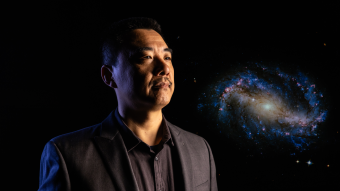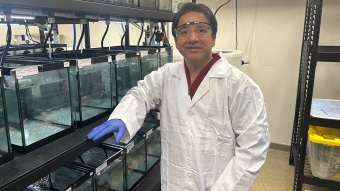
September 15, 2025
Contact: Brian Consiglio, consigliob@missouri.edu
Photo by Justin Kelley
A research team at the University of Missouri is working to predict which patients will benefit most from a specific type of cartilage transplant surgery, and some of the best clues may lie in patients’ urine.
In a recent study, a Mizzou team led by Jimi Cook, DVM ‘94, PhD ‘98, discovered that patients with high levels of nine specific proteins — found through collecting urine samples — were far less likely to have successful results from a knee procedure known as an osteochondral allograft transplantation, where damaged cartilage is replaced with healthy tissue from a donor. It is a procedure that uses biological solutions to preserve a patient’s natural joint rather than artificial metal or plastic joint replacements.
This discovery could help patients with knee pain make more informed decisions about when and what type of surgery is likely to work best for them.
“While most knee surgeries are successful, I ultimately want all of them to be successful,” said Cook, the William and Kathryn Allen Distinguished Chair of Orthopaedic Surgery in the School of Medicine. “By better understanding which protein biomarkers are linked with unsuccessful outcomes, we can determine the best data-driven treatment plan for each individual with knee pain before doing any invasive procedures. To me, that’s what precision medicine is all about.”
Levels of protein biomarkers in our urine are not set in stone for life; they fluctuate with age and other factors. A urine sample showing that a patient would not be a good candidate for a cartilage transplant surgery at one moment in time doesn’t mean surgery is off the table forever. This flexibility underscores Cook’s belief that solutions for orthopaedic problems should be tailored to each patient.
“Whether we are treating a professional athlete wanting to compete again or a grandparent wanting to safely and comfortably play with their grandkids, we genuinely care about helping people from all walks of life,” Cook said. “Mizzou’s leadership has provided us with the infrastructure, resources and people to make this game-changing research possible — our 12,000 square-foot Thompson Laboratory for Regenerative Orthopaedics in the Missouri Orthopaedic Institute is the world’s only comprehensive orthopedic research lab housed within a standalone orthopaedic hospital.”
Cook came to Mizzou as a student in 1990 before joining the faculty in 1998. In 2013, he joined the Missouri Orthopaedic Institute and since then, he and his colleagues have helped thousands of patients with joint pain decide on an optimal treatment plan based on their life goals by taking a holistic approach to patient-centered care and evidence-based, shared decision-making.
“We’ve spent 15 years focused on optimizing the surgery for the patient, and now we are focusing on optimizing the patient for the surgery,” Cook said. “These protein biomarkers give us important clues as to who can best benefit from this particular surgery. It’s extremely rewarding to work with a team that is passionate about helping patients make health care decisions that will improve their own outcomes as well as the patients that come after them.”
“Serum and urine biomarkers can predict outcomes after osteochondral allograft transplantation in the knee” was published in The Journal of Knee Surgery. Co-authors for this study are Mizzou’s Aaron Stoker, Kylee Rucinski and James Stannard.



